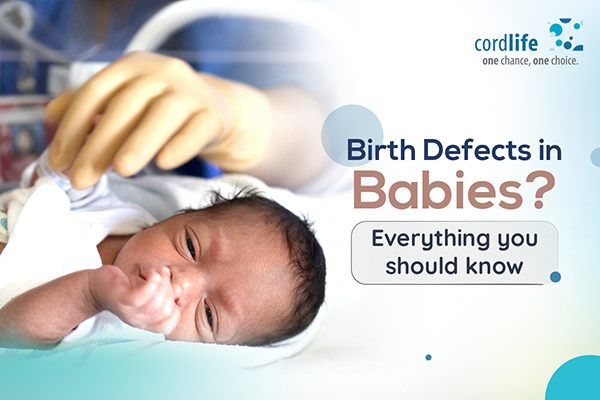Table of Contents
Birth Defects are basically structural changes in a baby’s body, which might cause problems in the overall health and life of a baby. Structural and Developmental birth defects are some of the common birth defects in babies.
- Structural Birth Defects like heart defects, cleft lip or palate, spina bifida and clubfoot occurs when a specific part of a baby’s body is missing or malformed.
- Developmental Birth Defects like down syndrome (Physical and mental developmental delay), sickle cell disease (red blood cells become misshapen), and cystic fibrosis (damage in the lungs and digestive system)
What Causes Birth Defects In Babies?
Birth defects are not just a sudden occurrence in babies. While most of them take place during the first 3 months of pregnancy, (when the baby’s organs are forming inside the mother’s womb), there are certain birth defects which can take place in the later stage of pregnancy, (especially in the last 6 months), when the baby’s tissues and organs are developing. There are also various other factors (under research) that can cause of birth defects during pregnancy.
Genetic Factors
When one or more genes change from working properly or a part of genes might have gone missing. Fragile X Syndrome is one of them, for example.
Chromosomal Factors
Chromosome are those structures that hold the genes. In some birth defects, a chromosome or part of a chromosome might be missing. In Turner syndrome, a condition that affects only females, results when one of the X chromosomes (sex chromosomes) is missing or partially missing. However, in Down Syndrome, the birth defective child might have additional chromosomes.
Environmental Factors
Your environment is everything. In fact, the place where you live in, the place where you work in, the kind of food that you eat and the way you spend your time are some of the things that can be harmful for the baby during pregnancy. Even baby birth defects occur from smoking, drinking alcohol or taking certain drugs during pregnancy.
Pre-existing Medical Condition
Your developing baby is the most vulnerable to injury during the embryonic stage. This is the period or stage when the baby organs are forming. Your Being plus size or experiencing uncontrolled diabetes, at this point, might increase the risk of birth defects in babies during pregnancy.
Getting Infected During Pregnancy
Yes! During pregnancy, due to the hormonal changes, your immune system might be slightly compromised. You might be more susceptible to contracting Zika virus or cytomegalovirus or rubella during pregnancy.
Taking Certain Medicines Can Also Lead To Birth Defects In Babies
If you take certain medicines, like Thalidomide and Isotretinoin, especially during the first three months of your pregnancy, they might result in birth defects in your developing baby.
Maternal Age
The biological clock may not be your best friend! Especially, when you’re trying for pregnancy or you’re already pregnant. That is, if you’re 35 years old or more, you’re more likely to develop high pressure and diabetes during your pregnancy. In which case, your health care provider might have to carefully monitor both the health conditions as there might be a high chance of your giving birth to a baby, who’s significantly larger than the average size. The risk of chromosomal abnormalities in the baby in utero (inside the womb) might also be high.
How To Avoid Birth Defects During Pregnancy?
To prevent the birth defects during your pregnancy, you might have to take these necessary steps:
- Including at least 400 micrograms (mcg) of folic acid every day, in the pregnancy-diet.
- Saying “No” to alcohol or smoke
- If possible, keep certain medical conditions under control (in consultation with the doctor) and try to stay active before conceiving.
- Taking important pregnancy vaccines and avoiding traveling to areas where Zika virus is spreading. Although this Covid-19 situation cannot be avoided, but pregnant women can still protect themselves by wearing masks, washing hands and using hand sanitizers whenever possible.
- Consult the health care provider about taking any prescribed medicines, over-the-counter (OTC) medicines, supplements and herbal products.
- High-mercury fish (like shark, swordfish, king mackerel, tuna, marlin, tilefish and orange roughy), raw and processed meat, raw eggs, intake of caffeine, raw sprouts, unwashed fruits, Raw milk, unpasteurized cheese, and soft-ripened cheeses and processed or junk food are some of the foods that cause birth defects during pregnancy. So, try to avoid them.
Research has it that 1 out 33 babies across the world are born with birth defects. All birth defects may not be prevented, but if a would-be mother understands the reasons for it , takes the necessary steps, (as mentioned above), and doesn’t miss the doctor’s appointment during her pregnancy, she can certainly increase her chances of giving birth to a chubby baby.
Also, visiting the blog page of Cordlife India to understand more about conceiving, pregnancy, childbirth, postpartum, baby care, parenting and of course cord blood banking would be helpful.
